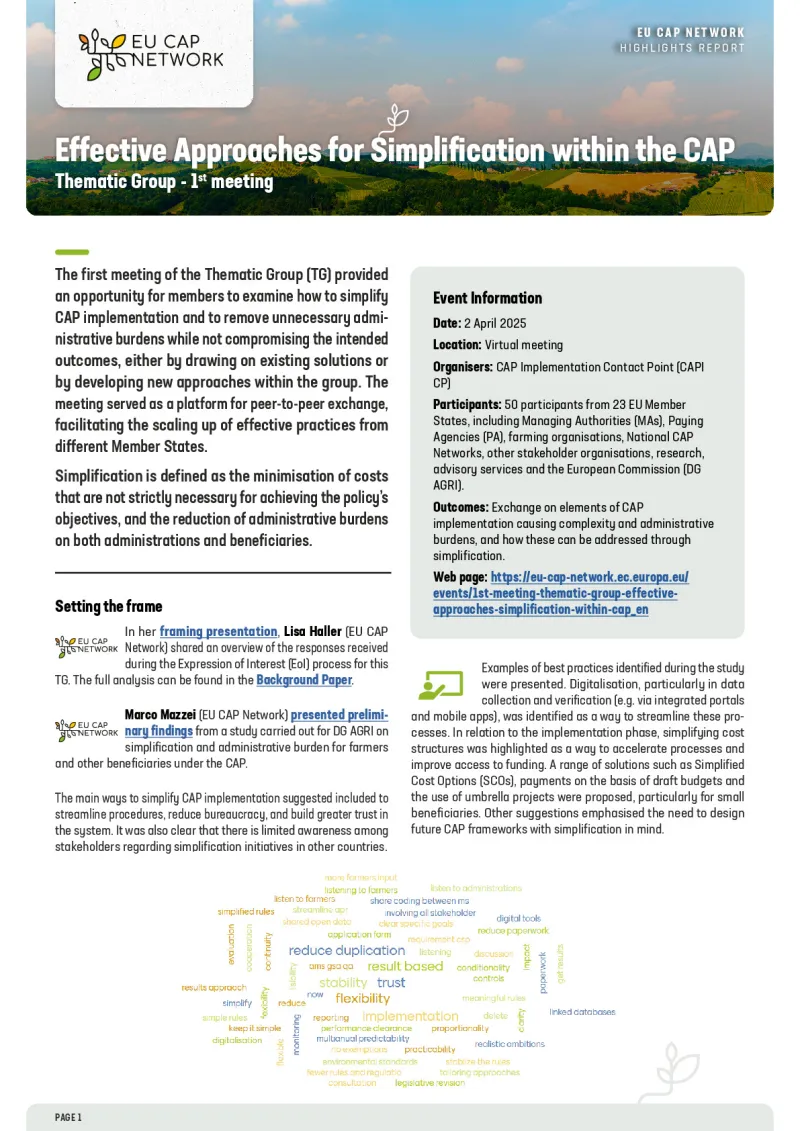Simplifying LEADER in practice at local level: the experience in Greece
New Simplified Cost Options (SCOs) for Local Action Groups are being introduced this year in Greece.
Simplification is a key political priority across the Commission's activities and a prominent part of the European Commission’s Vision for Agriculture and Food. A new package of simplification measures was proposed in May 2025 for the Common Agricultural Policy (CAP) and is also relevant for LEADER. Key elements of the second simplification package proposed in May concern simplification for farmers, support for small farmers, competitiveness and digitalisation, crisis management, and measures for Member State authorities.
A study by the EU CAP Network helped inform this CAP simplification package, and a recent EU CAP Network Thematic Group looked into CAP implementation challenges and practical simplification solutions (by sharing existing examples that can be replicated and developing new ideas), where LEADER can feature. While the simplification package focuses on EU-level simplification, actions for simplification can take place at different levels (EU, Member State, regions) and help reduce administrative burden and bureaucracy for beneficiaries and/or national authorities.
A balance in simplification is sought between improving access to funding for achieving relevant policy objectives while ensuring proper controls to protect public funds, as reiterated by the European Court of Auditors, which underlines that simplification efforts must not come at the expense of accountability and transparency. This balance applies to LEADER in the same way that it does to all other EU funding initiatives.
Simplified Cost Options (SCOs) were introduced to LEADER in the 2014-2020 programme and continue to feature in LEADER today. SCOs are increasingly seen as a potential way forward by the European Commission and by many Member States, with the experiences and insights gained through LEADER offering significant opportunities to inform their further development across the CAP. SCOs have the potential to ease the application process and reduce reporting and control requirements, thus simplifying the administration of projects (as is happening in Estonia).
Activities by the EU CAP Network, such as regular informal meetings of LEADER staff from national CAP Strategic Plan Managing Authorities and meetings of the Subgroup on LEADER and Territorial Development, have been helping Member States to better understand and share knowledge about how different countries are simplifying the implementation of LEADER. Greece has an inspiring example to offer.

Guidelines for simpler LEADER in Greece
New simplified systems for Local Action Groups (LAGs) are being introduced this year in Greece. A recent SCO study commissioned by the Greek Managing Authority highlighted options for five different SCO applications for LEADER. The results of the study have been used to inform a set of guidelines available on the Managing Authority's website (button “Θεσμικό Πλαίσιο” - 'Institutional framework’).
The guidelines, published in summer 2025, will help LAGs use SCOs with public and private project beneficiaries and cover simplified methods to assess implementation costs for LAG-funded cooperation and other projects.
It is expected that the use of simplified cost methods will simplify the submission and control process, as the need for detailed recording and documentation of actual costs is reduced. They are also expected to reduce the risk of errors or incorrect data in funding applications, leading to simpler control and evaluation procedures that are less prone to errors. The expected result will accelerate the release of funds and facilitate funding.

Inter-territorial and transnational cooperation - preparatory phases, workshops, and seminars
Cost reporting for expenses incurred during the full lifetime of a cooperation project (from inception to closure) is simplified (e.g. lump sums for events and exchange visits). A lump sum for travel expenses related to the preparation of inter-territorial cooperation projects has been introduced, with different amounts applicable for the coordinating LAG and the project partners. Special consideration can be given to lead partner LAGs in transnational cooperation projects.
Investment projects – SCO for construction expenses
This SCO (standard scales of unit costs per square metre) applies exclusively to construction expenses. It uses market prices for core work categories, establishing a maximum limit for acceptable costs based on 2024 prices (with the possibility for revision).
The aim is to simplify procedures and enable the objective assessment of the relevant costs of investment projects.
The approach is differentiated depending on the region (e.g. islands, difficult access) or construction type (e.g. community facilities, factories and business premises, accommodation facilities, etc). Maximum limits of acceptable costs are also detailed relating to partial payments, preparatory studies, surveys, fittings, furnishings and modernisation projects. The guide includes calculation examples to help potential beneficiaries.
Training actions under LEADER, based on activity type and number of trainees
This option is a form of standard scale of unit costs, and is applicable to training actions (with the exception of online training). Unit costs are assessed considering all the elements that constitute the total cost of a full training cycle, from preparation to evaluation (details on the method used for the quantification of such costs will be provided in the Guide). This SCO can also be used for activities such as field visits, demonstration events, and individual coaching. The Guide includes short explanations of different training scenarios to help beneficiaries categorise different contexts.
Cooperation between local actors
The eligible expenses include the costs related to the establishment of local cooperation schemes and the development of an action plan, i.e. the analysis of the area's problems, the cooperation objectives, and the actions required to achieve them.
The Guide aims to simplify the submission and control of relevant documents for LAGs by reducing the need for detailed recording and receipts of actual costs. In addition, the use of simplified costs reduces the risk of errors. Cooperation categories are set, and examples in the guidelines refer to collective bottom-up actions such as promoting healthy nutrition, food waste reduction, Smart Villages, and social and cultural networking. Eligible expenses include partnership set-up, action plan preparations, awareness raising, events, meetings, communication materials, and consultancies.
Running costs for LAGs
This SCO aims to facilitate management of approved Local Development Strategies, enhance transparency and contribute to a more efficient functioning of the funding process. Clear and predefined parameters are created for the calculation of costs, such as flat rate financing determined by the application of a percentage to the total payroll amount for LAG staff, the link between payroll costs and operating expenses, or operating expenses (e.g. investments in fixed assets and other equipment, travel expenses, support activities). These are based on payroll data for LAG staff, as well as data on other reference running costs related to LEADER (e.g. community animation, project monitoring, and communications).
Results of such LEADER simplification aim to help streamline Greek programme management, enhance transparency, and improve funding efficiency.


